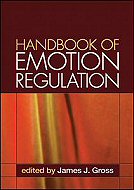|
Handbook of Emotion Regulation
|
|
Edited by James J. Gross
|

|

Emotions play an essential role in human behavior, motivation, and social interactions. Yet emotions - when they occur at the wrong time, or at the wrong intensity level - can hurt as well as help. What do people do to regulate their emotions? How do temperament and learning interact to shape an individual's unique style of emotion regulation? How are inappropriate emotional responses implicated in mental and physical health problems? Addressing these and other compelling questions, this volume brings together foremost experts to provide a comprehensive roadmap of this important, rapidly growing area of research.
The Handbook begins with an introductory overview that defines key terms and outlines a conceptual framework for the chapters that follow. Subsequent sections cover biology, cognition, development, personality processes and individual differences, and social psychological approaches. Bridging the gap between basic processes and clinical applications, the final section considers implications for psychopathology, clinical interventions, and health. Each chapter reviews the current state of knowledge on the topic at hand, describes salient methods, and identifies promising directions for future investigation. Central themes include the ways people regulate both positive and negative emotions, the role of conscious and unconscious processes, and the costs and benefits of different regulatory strategies in different contexts. Facilitating integration across lines of research that have often remained disparate, many of the contributors actively engage with ideas and perspectives raised in other chapters. […]
James J. Gross, PhD, is an Associate Professor in the Department of Psychology, a faculty member in the Neuroscience Program, and the Director of the Stanford Psychophysiology Laboratory at Stanford University. He is a leading researcher in the areas of emotion and emotion regulation, and is well known for his innovative theoretical and experimental analyses of emotion regulation processes.[…] He is also the Director of Stanford Psychology One Teaching Program.
|
|
